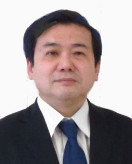


Hitoshi Sugimoto
President
Japan Comparative Education Society
It is a great honor to have been elected as the fifteenth president of the Japan Comparative Education Society. I am especially pleased to lead the Society when we celebrate the fiftieth anniversary of the Society which was established in 1964. The Graduate School of Education, Kyoto University will host the JCES office for the next three years under the management of the chief secretariat, Associate Professor Hirotaka Nambu. Kyoto University has the office for the first time in 27 years after the leadership of the late Dr. Tetsuya Kobayashi, the fifth president. I now accept the great responsibility to lead the Society, whose memberships now stands at nearly one thousand.
I have been an active participant in the Society since I first became a member over thirty years ago. I began my career as a researcher in Southeast Asia, conducting comparative studies on education policies in Malaysia and Singapore. I was fortunate to have two precious opportunities to study abroad at the University of Malaya, Malaysia, and in the University of Reading, the UK, before I was appointed to Kyoto University. These international experiences were also a starting point of my recent interest in transnational higher education, an emerging type of study abroad that allows a student to seek a degree in a country other than the one where the awarding institution is based.
It is my aspiration to contribute to the development of the Society not only by increasing the number of members but also by fostering unity and cohesion so that the Society will have active and committed members. Our current success owes so much to the former president Dr. Yutaka Otsuka who led us for six years. His was the second longest administration after the fifteen-year leadership of founding president Dr. Hiratsuka. Some of the outstanding attainments of Dr. Otsuka were the compilation of the “Encyclopedia of Comparative Education,” the publishing of the CD “50 years’ history of JCES,” and the establishment of agreements on exchange systems of Journals of neighboring overseas associations. As a final gift he left us the lovely logo of our Society. I hereby would like to express my heartfelt gratitude to Dr. Otsuka for his long and sincere devotion to the JCES.
In recent years I have been involved in the study of education within the context of the Gross National Happiness Index proposed in the Kingdom of Bhutan, a tiny Himalayan Kingdom. Bhutan has a high ambition to incorporate traditional values into the modern concept of education to help students promote their feeling of happiness. The former King of Bhutan pronounced that development should be understood as a process that seeks to maximize happiness of the people rather than the economic growth of the nation. This is an alternative idea to the Western concept of development and analyzes the human efforts to construct education systems in which schools and teachers will act as the facilitators of students’ happiness and self-satisfaction. How can you dare promise, as a teacher, a lecturer, a professor or an administrator, that you will surely make your students happy after the completion of your class or course? We are not able to guarantee happiness to all students because education has a function of screening pupils, which inevitably produces losers as well as winners. We need to face this innate function of education and try to minimize the source of people’s unhappiness.
I am so much inspired and moved by the strong confidence of the Government of Bhutan to achieve this difficult and sublime goal. I am of the opinion that this is possible only because they share a single common definition of happiness among them, stemming from Buddhist philosophy and Tibetan thought as well as their vicarious experience of the omniscience of Lord Buddha. We understand that we cannot copy this policy because the members of JCES are far more heterogeneous in beliefs and secure in life-styles. Being able to dismiss the desire to compare oneself with others is called an absolute sense of happiness. We can hardly reach such status of mind so long as we are engaged in trials that seek to quantify and rank our happiness.
According to several international investigations, Japan, despite its high economic development, is not found in the higher ranks in the national order of happiness levels. On the contrary, Bhutan is ranked among the highest of the countries investigated. The sense of happiness does not directly reflect the nation’s economic situation, but is dependent on what surrounds us and how we compare ourselves with our neighbors. Comparison, ironically, can be a source of unhappiness and may lead to an unsatisfactory state of mind, but it also can be a great promoter of aspiration to encourage us to change and to seek a higher target. As the president of the Japan Comparative Education Society, I would like to encourage the Society to seek the comparatively higher target, but at the same time I would like to foster unique aspects of our Society that will sustain the contentment and cohesion of our members.
2014